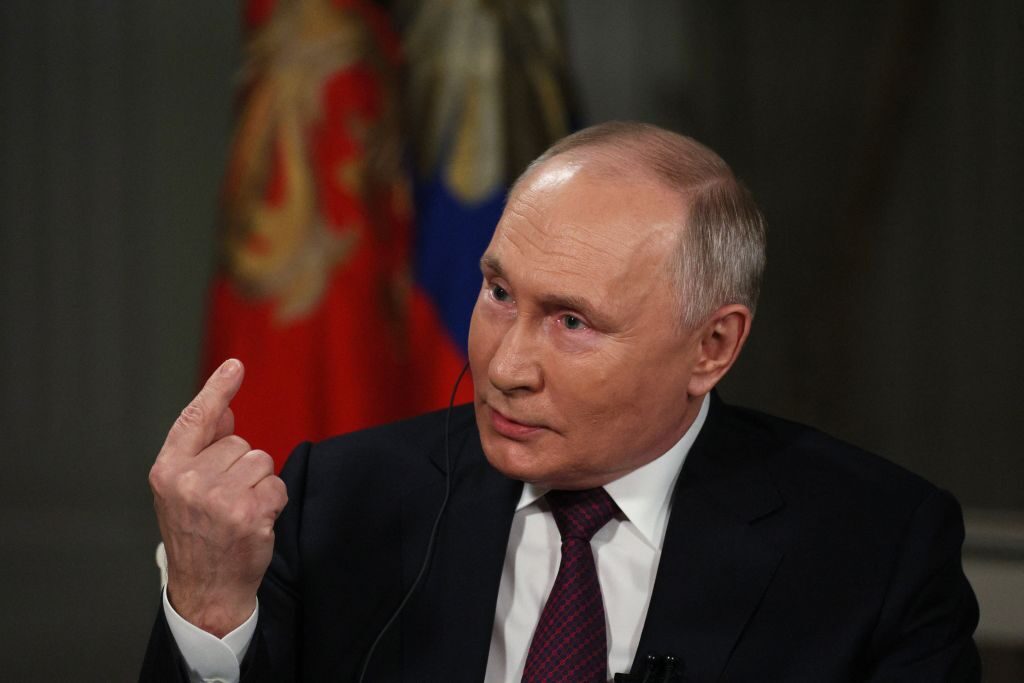2024-02-09 06:13:46
Russian strongman Vladimir Putin encouraged America to allow China to expand its economic influence in the West in an interview with journalist Tucker Carlson published on Thursday, the same day Putin held a lengthy chat with Chinese dictator Xi Jinping boasting of the trade volume between their two countries.
Putin – who sat with Carlson in Moscow for a nearly two-hour interview with a prominent emphasis on early medieval history – told Carlson, as a stand-in for America, “you are hurting yourself” by attempting to limit malignant Chinese Communist Party influence on the American economy.
Ep. 73 The Vladimir Putin Interview pic.twitter.com/67YuZRkfLL
— Tucker Carlson (@TuckerCarlson) February 8, 2024
“Do Chinese businesses have small presence in the United States? Yes, the political decisions are such that they are trying to limit their cooperation with China,” Putin observed, according to a translation of his comments by the Kremlin. “It is to your own detriment, Mr Tucker, that you are limiting cooperation with China, you are hurting yourself. It is a delicate matter, and there are no silver bullet solutions, just as it is with the dollar.”
Carlson asked Putin if he was concerned that China, a “much less sentimental and forgiving colonial power” than America, was ascendant in a way that could hurt Russia, which Putin dismissed as a “boogeyman story.”
“It is a boogeyman story. We are neighbours with China. You cannot choose neighbours, just as you cannot choose close relatives. We share a border of 1000 kilometers with them. This is number one,” Putin asserted.
“We are always told the same boogeyman story, and here it goes again, though in a euphemistic form, but it is still the same bogeyman story: the cooperation with China keeps increasing,” he continued. “The pace at which China’s cooperation with Europe is growing is higher and greater than that of the growth of Chinese-Russian cooperation. Ask Europeans: aren’t they afraid? They might be, I do not know, but they are still trying to access China’s market at all costs.”
Putin went on to claim that China – a country that is actively attempting to seize the sovereign territory of Vietnam, the Philippines, Malaysia, Brunei, India, Japan, and the entire nation of Taiwan – was seeking “compromise” with the world.
“China’s foreign policy philosophy is not aggressive, its idea is to always look for compromise, and we can see that,” Putin claimed.

In this pool photograph distributed by Russian state agency Sputnik, Russia’s President Vladimir Putin gives an interview to U.S. talk show host Tucker Carlson at the Kremlin in Moscow on February 6, 2024. (Photo by Gavriil GRIGOROV / POOL / AFP) (Photo by GAVRIIL GRIGOROV/POOL/AFP via Getty)
In reality, China’s economic expansion has been accompanied by colonialist aggression – particularly in Africa, where its Belt and Road Initiative (BRI) loans have trapped some of the most impoverished countries on the continent and allowed for the importing of racist Chinese abusers. In America, China’s economic influence has been accompanied by a collapse of American manufacturing, widespread intellectual property theft, and the presence of slave-made products in American stores, among other calamities.
Putin’s assessment of China’s role in the American economy aligns with that of current President Joe Biden, who as a candidate insisted it was “bizarre” to think of China as a rival to America.
“The idea that they are our competition, that they’re going to beat us, is bizarre,” Biden said in 2020. “We talk about China as our competitor, we should be helping and benefiting ourselves by doing that. But the idea that China is going to eat our lunch — It’s like I remember the debates in the late nineties — remember Japan was going to own us? Give me a break.”
The Biden family has made millions of dollars in business deals in China.
The Biden administration has implemented the president’s ideas into policy. Secretary of State Antony Blinken, during a recent trip to China, insisted that the White House was not interested in “decoupling” America’s economy from a communist totalitarian system, and he considered it a priority to “disabuse our Chinese hosts of the notion that we are seeking to economically contain them.”
In stark contrast, Biden’s rival in the 2024 presidential election, former President Donald Trump, has promised to implement a “sweeping pro-American overhaul of our tax and trade policy” if reelected that would include tariffs and other policies intended to limit Chinese influence in the American economy.
“We will revoke China’s most-favored-nation trade status and adopt a four year plan to phase out all Chinese imports of essential goods, everything from electronics to steel to pharmaceuticals,”
Trump promised in March 2023. “This will include strong protections to ensure China cannot circumvent restrictions by passing goods through conduit countries – countries that don’t make a product, but all of the sudden they’re selling a lot of product. It comes right through China, right out China, and right into our country.”
.@DonaldJTrumpJr tears into Biden’s incoherent trade stance: “China has been stealing the American dream from all of you, from your kids, from your grandkids for decades, and this clown doesn’t think it’s a problem?” https://t.co/lM5clucOcC
— Breitbart News (@BreitbartNews) May 21, 2019
“We will also adopt new rules to stop U.S. companies from pouring investments into China and to stop China from buying up America … And we will eliminate federal contracts to any company that outsources to China,” he concluded.
As president, Trump implemented tariffs on a variety of Chinese goods worth $34 billion in 2018. Four years later, a report by the business outlet Bloomberg revealed that the tariffs had inspired the expansion of American manufacturing and moved U.S. companies to seek partnerships with suppliers outside of China. The report found a 120-percent increase in the construction of new manufacturing plants in America between 2021 and 2022.
The Kremlin touted a friendly phone call between Moscow and Beijing on Thursday in which Xi and Putin reportedly insisted on the benefits of their mutual trade. Putin reportedly called Xi on the occasion of the Lunar New Year.
The dictators “stressed, with satisfaction, that bilateral trade exceeded $200 billion a year ahead of the goal set by the leaders, reaching a record of $227.7 billion,” the Kremlin said in a readout of the conversation. “[T]he presidents expressed mutual interest in promoting cooperation across all areas, including energy, finance, infrastructure, transport, industrial production, agriculture, humanitarian and sport exchanges.”
Follow Frances Martel on Facebook and Twitter.






